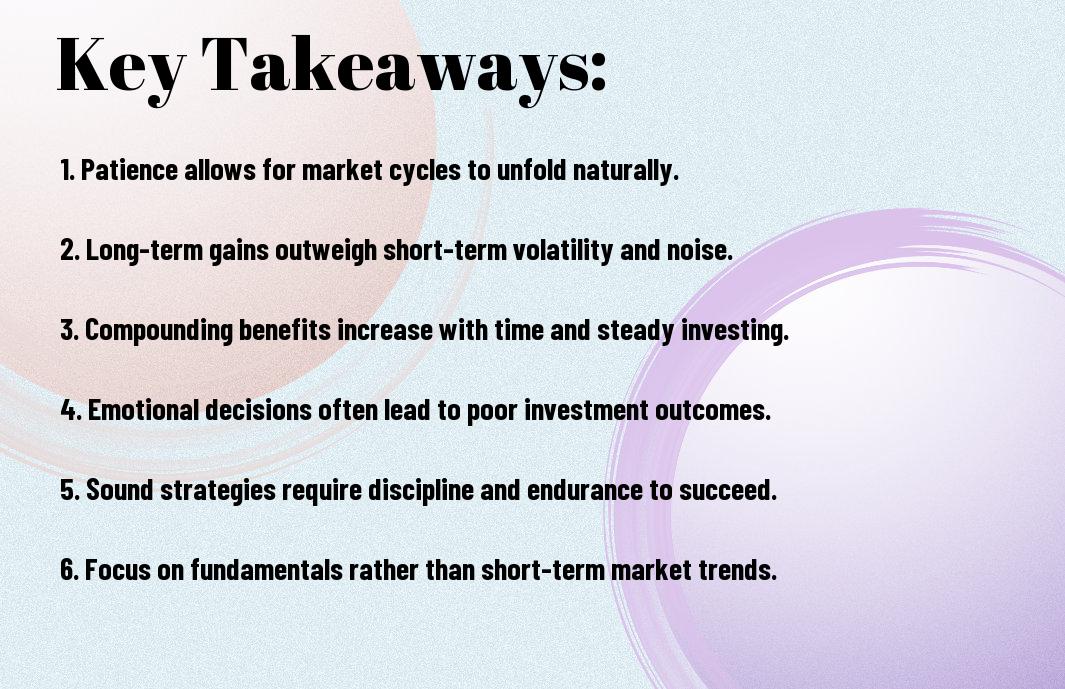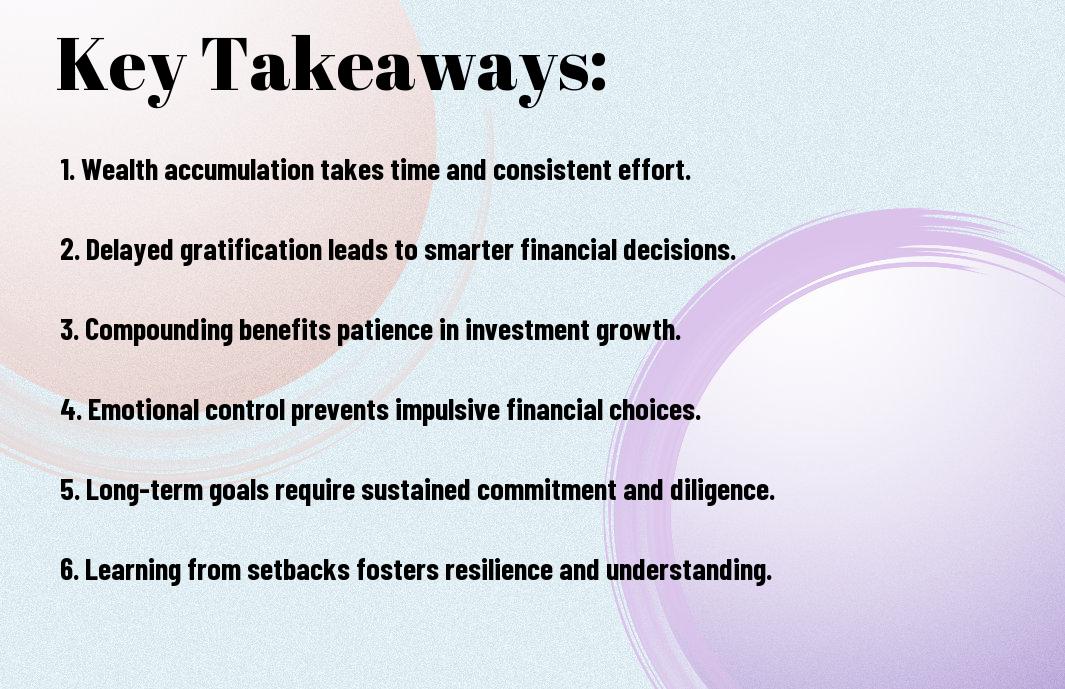Long-term investing requires a mindset that embraces patience as a key component to your financial success. As you navigate the complexities of the market, understanding how patience impacts your investments can help you make informed decisions. This article will guide you through the concept of patience in investing, its benefits, and practical strategies to cultivate this trait. By applying these principles, you’ll be better equipped to achieve your financial goals over time.

Key Takeaways:
- Compounding Growth: Patience allows investors to benefit from the power of compounding, significantly increasing their returns over time.
- Market Fluctuations: Staying patient during market volatility helps investors avoid panic selling and impulsive decisions that can harm long-term gains.
- Investment Horizon: A long-term investment strategy requires a commitment to holding assets over extended periods, maximizing the potential for appreciation.
- Emotional Discipline: Practicing patience helps investors maintain emotional discipline, focusing on their goals rather than short-term market movements.
- Strategy Implementation: Patience is key to consistently following a well-researched investment strategy, enabling better decision-making in the face of challenges.

Understanding Long-Term Investing
A successful investment strategy emphasizes long-term gains over short-term fluctuations. Long-term investing means buying and holding assets for an extended period, often years or even decades, allowing you to ride out the volatility of the market and benefit from overall growth. This approach is designed to take advantage of compounding returns, thereby increasing your wealth over time.
Definition and Importance
The essence of long-term investing lies in maintaining a disciplined strategy that focuses on growth and wealth accumulation over time. By understanding this approach, you enhance your ability to navigate market unpredictability and capitalize on opportunities that arise over the years, ultimately leading to financial stability and success.
Key Principles of Long-Term Investing
Besides having a clear investment strategy, long-term investing requires a commitment to discipline, patience, and informed decision-making. You should focus on selecting high-quality assets, diversifying your portfolio, and avoiding impulsive reactions to market changes. Establishing a long-term perspective can help you weather downturns and remain focused on your goals.
Also, it’s important to regularly review your investment portfolio to ensure it aligns with your long-term objectives. You might consider factors such as changing financial circumstances, market conditions, or shifts in risk tolerance. By being proactive while remaining patient, you effectively build resilience in your investment strategy, allowing you to harness the true potential of your assets over time.
The Psychological Aspect of Patience
The psychological aspect of patience plays a significant role in your journey as a long-term investor. Embracing patience helps you navigate through the ups and downs of the market, reinforcing the importance of maintaining a steady mindset. This can alleviate anxiety associated with short-term fluctuations and enable you to focus on your long-term financial goals, ultimately leading to better investment decisions.
Emotional Resilience
Along your investment journey, building emotional resilience is key. It empowers you to withstand inevitable market dips without succumbing to fear or panic. By accepting that short-term volatility is a natural part of investing, you can maintain a focused perspective, helping you to stay true to your long-term strategy and avoid impulsive decisions that could derail your financial objectives.
Overcoming Short-Term Market Volatility
Before you can successfully navigate the investment landscape, you must understand how to overcome short-term market volatility. By adopting a long-term mindset, you can reduce the impact of market fluctuations on your emotions and investment choices. Embracing this approach allows you to capitalize on the market’s inherent unpredictability rather than be adversely affected by it.
For instance, if you can keep your attention on the long-term performance of your investments, you are less likely to react emotionally to daily market changes. Understanding that volatility can present opportunities to buy undervalued assets allows you to turn potential setbacks into advantages. This shift in perspective is necessary for maintaining your investment strategy and achieving your financial goals.
Strategies for Cultivating Patience
To cultivate patience in your investment journey, consider strategies that support long-term thinking. Understanding that patience is effectively an asset, as highlighted in Patience: not merely a virtue, but an asset, can guide your approach. Create routines and practices that reinforce a steady commitment to your investment goals while avoiding impulse decisions driven by short-term market fluctuations.
Setting Clear Investment Goals
Setting clear investment goals is fundamental to maintaining your patience. By defining specific, measurable, achievable, relevant, and time-bound (SMART) objectives, you create a framework that keeps you focused on your long-term aspirations. This clarity helps you resist the temptation to react to unpredictable market trends and empowers you to stay the course, ultimately enhancing your overall investment experience.
Developing a Disciplined Mindset
Along your investment journey, developing a disciplined mindset will serve as a cornerstone of your success. Adopting a consistent approach to evaluating investments, and adhering to a pre-established strategy, allows you to filter out emotions that may cloud your judgment. With time, this discipline fosters confidence in your decisions, solidifying your commitment to long-term investing.
Cultivating a disciplined mindset involves establishing routines, including periodic reviews of your investment portfolio and ongoing education about market trends. By minimizing emotional responses and focusing on your defined goals, you empower yourself to make informed decisions, even during volatile periods. This disciplined approach not only reinforces patience but strengthens your resilience against the lure of quick gains, thereby enhancing your overall investment strategy.
The Impact of Patience on Investment Returns
Not every investor enjoys immediate returns, and that’s where patience plays a transformative role. The longer you hold onto your investments, the more likely you are to realize significant gains. Historical data shows a positive correlation between time in the market and portfolio performance, encouraging you to avoid knee-jerk reactions to market fluctuations.
Historical Performance Analysis
Behind the scenes, numerous studies illustrate the benefits of patience in investing. For instance, research from J.P. Morgan indicates that while the S&P 500 index has experienced fluctuations with numerous declines, a 20-year holding period has historically resulted in positive returns for investors, averaging around 7-10% annually. This demonstrates that steadfastness during downturns can yield promising outcomes in the long run.
Case Studies: Successful Long-Term Investors
Analysis of renowned investors highlights how patience has significantly shaped their success. Consider the following case studies that underline the gains achieved through a long-term perspective:
- Warren Buffett: Over 50 years, Buffett’s Berkshire Hathaway has recorded an average annual return of 20%, showcasing the power of patience and time compounded.
- Peter Lynch: During his time managing the Fidelity Magellan Fund, Lynch achieved an average annual return of 29%, crediting long-term strategies and patience with solid companies.
- John Bogle: As the founder of Vanguard, Bogle’s investment strategies, emphasizing low-cost index funds, led to an average market return of about 10% for investors over decades.
Patience is a hallmark of successful investing, revealing that time can work in your favor. Each of these investors capitalized on market growth by resisting the urge to act hastily. Their impressive returns underscore the value of a long-term perspective and the rewards that come with weathering market volatility.
Common Pitfalls of Impatience
Unlike the steady approach needed for long-term investing, impatience often leads to hasty decisions. Many investors, eager for quick returns, frequently abandon their strategies at the first sign of market turbulence. This not only undermines the potential gains of a well-planned investment but also increases the likelihood of incurring unnecessary losses. By recognizing these pitfalls, you can cultivate the patience required to navigate the volatility of investing effectively.
Market Timing and Its Risks
For many investors, a desire to outsmart the market leads to attempts at timing buys and sells. This strategy often backfires, as accurately predicting market movements is incredibly challenging. The act of trying to time the market can result in missing significant upswings and ultimately diminishing your long-term returns. By focusing on your investment goals rather than trying to chase fleeting opportunities, you position yourself for sustained growth.
Detrimental Decisions Driven by Emotion
Timing decisions based on emotions can derail your investment strategy. Fear and greed can cloud your judgement, pushing you towards impulsive actions that may not align with your investment goals. When markets decline, the urge to sell off investments can be overwhelming, often leading to losses that could have been avoided with a more composed approach. Emotional reactions can prevent you from sticking to your well-thought-out investment plan, significantly impacting your financial future.
And when emotions govern your decisions, it often leads to a cycle of regret and uncertainty. For example, selling in a panic during market downturns might seem like a protective measure, but it can lock in losses and prevent you from benefiting from future recoveries. To counteract this tendency, focus on cultivating a disciplined approach to investing, allowing your strategies to guide you rather than transient emotions. This mindset helps you remain steadfast through market fluctuations, ensuring more consistent long-term success.
Tools and Resources for Long-Term Investors
Keep your investing journey on track by utilizing a variety of tools and resources. From portfolio management software to market research platforms, you can leverage technology to make informed decisions. Financial news websites, investment forums, and social media can also provide insights and updates to enhance your investment strategy. Accessing these resources consistently will help you evaluate your investments and stay aligned with your long-term goals.
Portfolio Management Strategies
With the right portfolio management strategies, you can effectively balance risk and reward in your investments. Diversifying your holdings across various asset classes minimizes potential losses while maximizing growth opportunities. Regularly rebalancing your portfolio, adjusting asset allocation according to market conditions, and setting clear investment goals are necessary practices to ensure your investment strategy remains aligned with your long-term aspirations.
Education and Continuous Learning
Beside effective strategies, continual education plays a significant role in your success as a long-term investor. Staying informed about market trends, financial instruments, and economic indicators can empower you to make sound decisions. Whether through online courses, webinars, or financial books, expanding your knowledge will enhance your confidence and ability to navigate challenges in the investment landscape.
Investors who commit to ongoing education are more likely to adapt to changing market conditions and seize new opportunities. Engaging in educational resources keeps you updated with the latest investment strategies, sector developments, and economic shifts. Actively participating in investment communities and discussions can also expose you to diverse viewpoints and insights, further enriching your understanding of long-term investing. Making learning a part of your routine not only sharpens your skills but also builds a solid foundation for achieving your financial goals.
Summing up
With this in mind, you should recognize that patience is a fundamental element of successful long-term investing. By maintaining a long-term perspective and resisting the urge to react impulsively to market fluctuations, you can better position your portfolio for growth. Embracing a patient mindset allows you to capitalize on compound growth and navigate through market downturns effectively. Ultimately, your investment success will largely depend on your ability to stay focused on your goals and trust the process over time.
Q: Why is patience important in long-term investing?
A: Patience is vital in long-term investing as it allows investors to weather market volatility and avoid making impulsive decisions based on short-term market fluctuations. By committing to a long-term strategy, investors can benefit from the power of compounding returns and the ability to ride out downturns in the market. This long-term perspective provides the opportunity to capitalize on the inherent growth of investments over time, rather than focusing on quick gains that may lead to emotional decision-making.
Q: How does patience influence investment success over time?
A: The influence of patience on investment success is significant, as it often leads to better financial outcomes. Investors who maintain a long-term outlook tend to hold their assets through market dips, which can enhance their overall returns. By resisting the urge to react to short-term events, these investors can benefit from the natural trend of the market to rise over time. Additionally, those who exercise patience can also take advantage of lower entry points during market corrections, positioning themselves favorably for future gains.
Q: What strategies can investors use to cultivate patience in their investment approach?
A: To foster patience in investing, individuals can implement several strategies. Setting clear and realistic long-term goals can help keep focus away from immediate market fluctuations. Establishing a consistent investment plan, such as dollar-cost averaging, minimizes emotional reactions and encourages steady contributions over time. Additionally, keeping informed about the fundamentals of their investments rather than reacting to market news can strengthen their confidence and commitment to staying the course. Lastly, engaging with a financial advisor can provide guidance and support that reinforces a long-term mindset.

